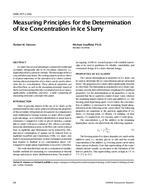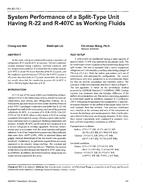This study examines the effectiveness of using C02 -based demand-controlled ventilation (DCV) to provide adequate indoor air quality with minimum energy use. A detailed building energy analysis program (ENERPASS) was combined with a contaminant level prediction program (CONTAM) to perform the analysis. The combined program was used to evaluate the annual heating and cooling energy consumption and carbon dioxide and formaldehyde concentrations. The assessment was made on a mid-sized commercial building designed to comply with ASHRAE 90.1 for four climate zones (Chicago, Nashville, Phoenix and Miami). Three separate hvac systems were studied: single zone (i.e., multiple roof-top units), multi-zone and variable air volume (VAV). The simulations were made for five ventilation control strategies: fixed ventilation, building return air controlled to 1000 ppm and 800 ppm, floor return air controlled to 1000 ppm and each zone controlled to 1000 ppm.
Product Details
- Published:
- 1995
- Number of Pages:
- 64
- File Size:
- 1 file , 1.7 MB
- Product Code(s):
- D-RP-740


